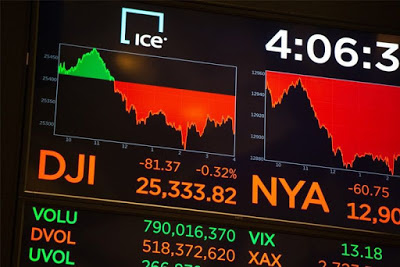Global stocks fell Thursday amid heightened concerns over the escalating trade dispute between the U.S. and China.
The Stoxx Europe 600 was down 0.3% in early morning trading, while in
Asia the Shanghai Composite Index dropped 2% and Hong Kong’s Hang Seng
fell 2.3%.
Asia the Shanghai Composite Index dropped 2% and Hong Kong’s Hang Seng
fell 2.3%.
Japan’s Nikkei and South Korea’s Kospi were also down, by 1% and 1.6% respectively.
In a sign of investor concern, Germany’s export-heavy DAX fell 1.2%
despite a declining euro, which makes exports more attractive.
despite a declining euro, which makes exports more attractive.
On Wednesday the Trump administration threatened to more than double
proposed tariffs on $200 billion of Chinese goods to 25%, up from an
original 10%.
proposed tariffs on $200 billion of Chinese goods to 25%, up from an
original 10%.
While the administration didn’t give specific reasons for the
potential increase, industry officials who have discussed the move with
the White House say one reason is to compensate for a declining yuan.
The Chinese currency has dropped over 7% against the dollar in the last
three months.
potential increase, industry officials who have discussed the move with
the White House say one reason is to compensate for a declining yuan.
The Chinese currency has dropped over 7% against the dollar in the last
three months.
President Donald Trump has expressed displeasure over the weakened
currency, which makes Chinese products more competitive in global
markets.
currency, which makes Chinese products more competitive in global
markets.
Senior administration officials said they would ask for comments from
industry on both proposed tariff levels. A final decision on the rate
isn’t expected until September at the earliest.
industry on both proposed tariff levels. A final decision on the rate
isn’t expected until September at the earliest.
Rising U.S. interest rates have also been seen as a threat to Asian
companies, as they make paying back or refinancing dollar-denominated
debt more difficult.
companies, as they make paying back or refinancing dollar-denominated
debt more difficult.
While the Federal Reserve left short-term interest rates unchanged
Wednesday, an upbeat assessment of the U.S. economy’s performance
suggests another rate increase is likely at the next meeting. Analysts
expect an additional two rate rises this year.
Wednesday, an upbeat assessment of the U.S. economy’s performance
suggests another rate increase is likely at the next meeting. Analysts
expect an additional two rate rises this year.
The Bank of England, meanwhile, is expected to raise interest rates later Thursday for only the second time in a decade.
Yields on 10-year U.S. edged down on Thursday to 2.994% after ticking
above 3% Wednesday. Yields and prices move in opposite directions.
above 3% Wednesday. Yields and prices move in opposite directions.
In currencies, the Turkish lira was down 0.7% against the dollar on
Thursday–bringing its loss this year above 24%–after the White House
announced Wednesday it would sanction the country over the detention of a
U.S. pastor.
Thursday–bringing its loss this year above 24%–after the White House
announced Wednesday it would sanction the country over the detention of a
U.S. pastor.
The WSJ Dollar Index, which measures the currency against a basket of 16 others, was up 0.2%.
In commodities, Brent crude rose 0.4% to $72.68 a barrel, but remains
down 2.2% this week after an unexpected increase in U.S. inventories of
crude reignited worries of oversupply. Gold edged lower 0.1% to
$1,226.90 an ounce.
down 2.2% this week after an unexpected increase in U.S. inventories of
crude reignited worries of oversupply. Gold edged lower 0.1% to
$1,226.90 an ounce.





